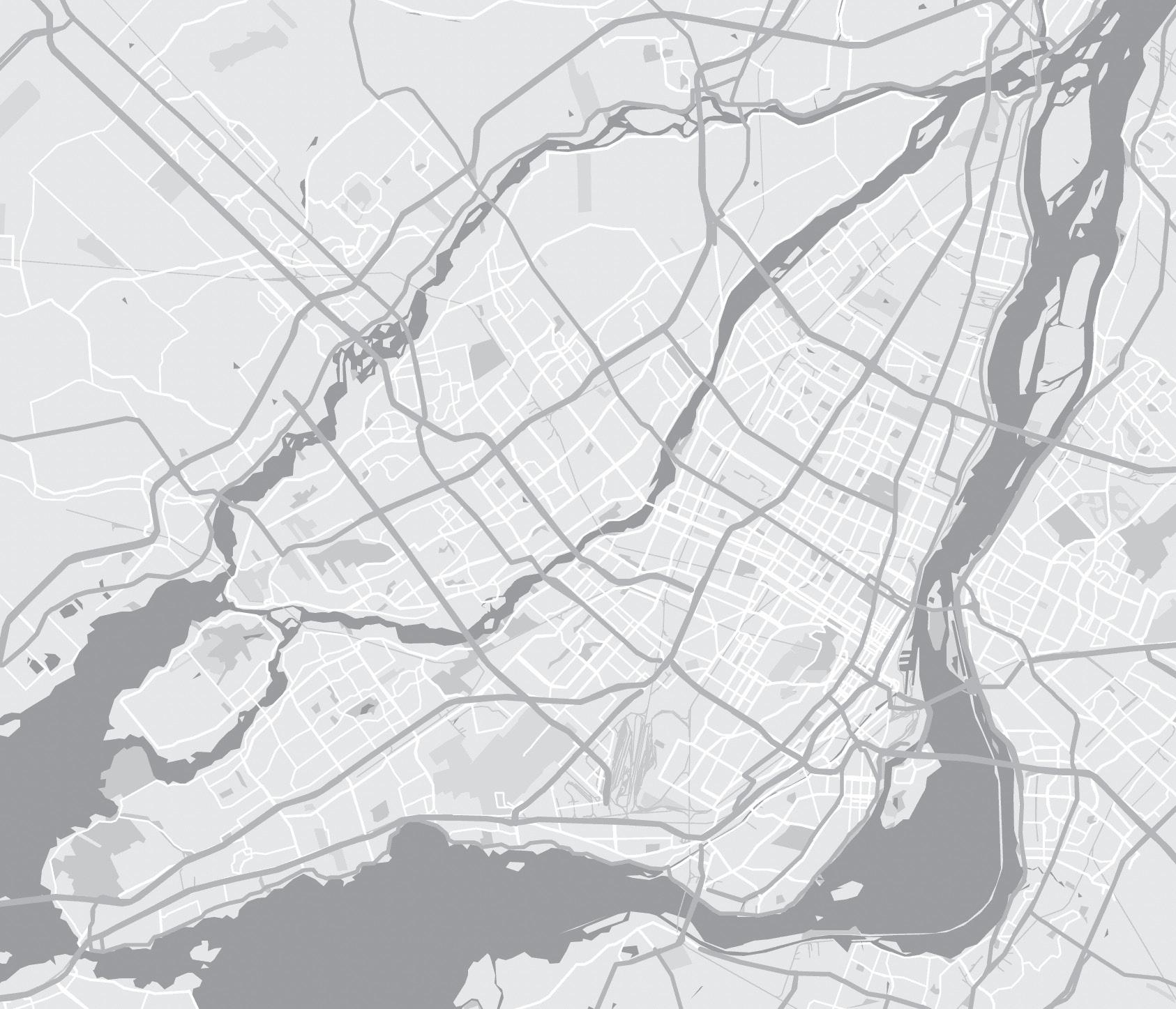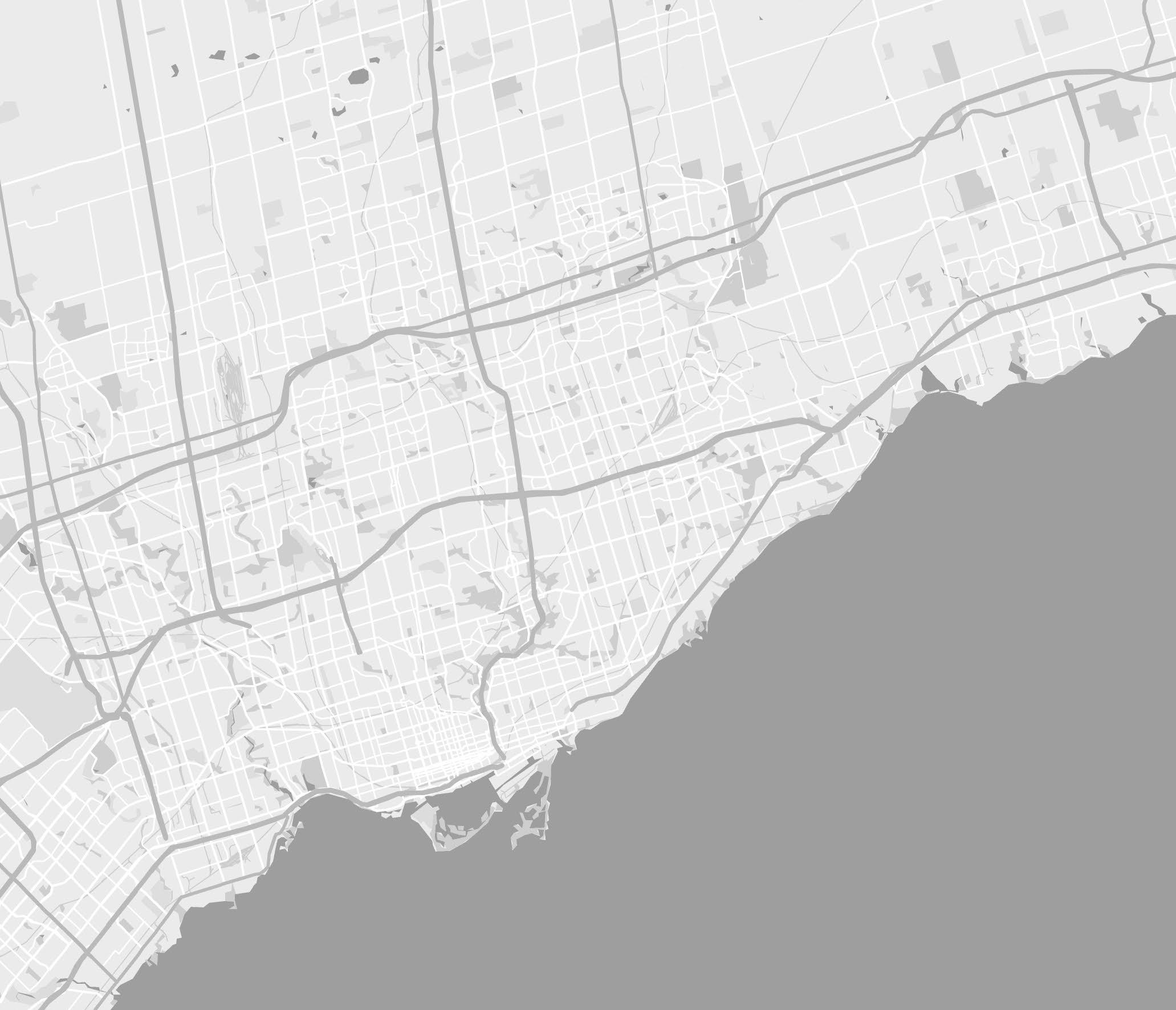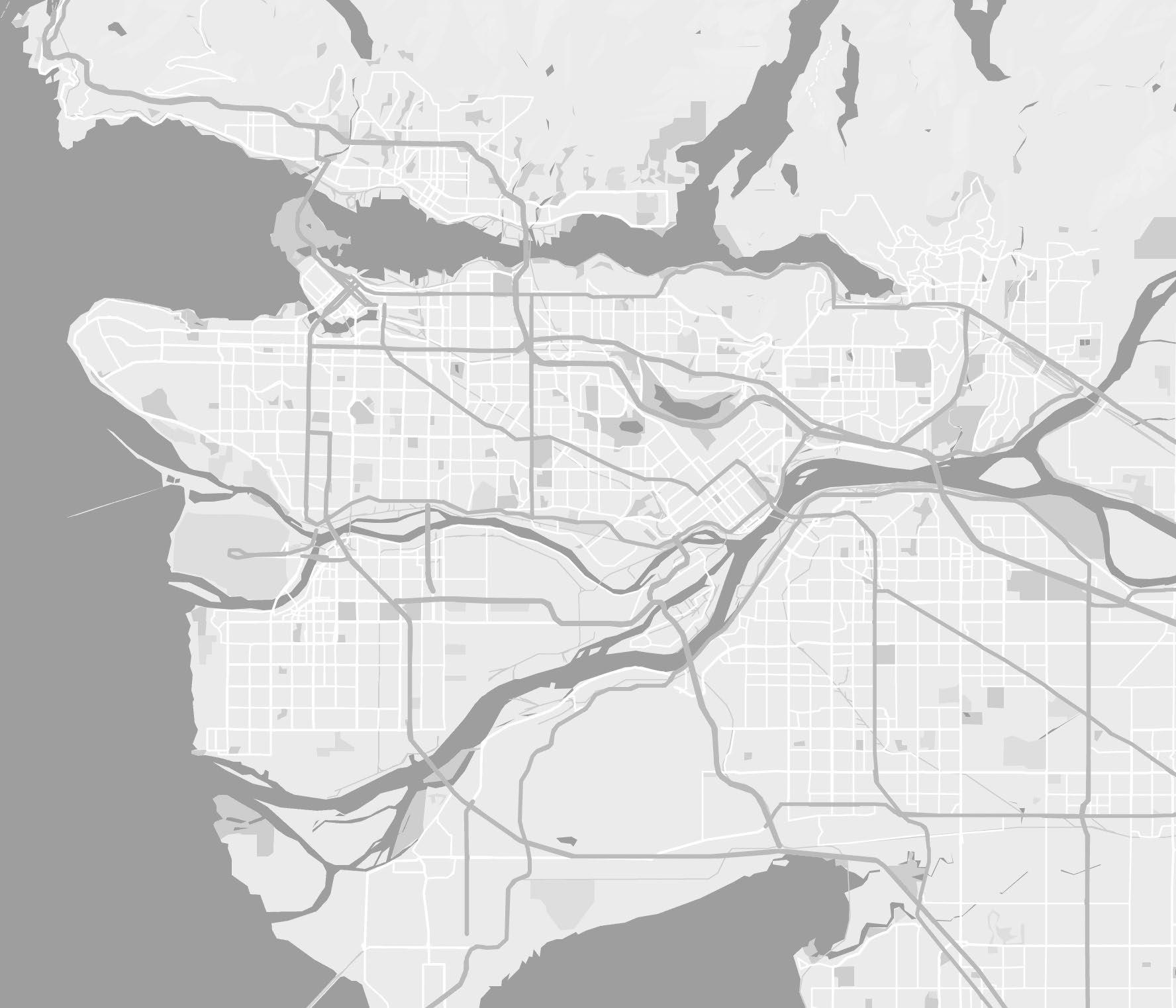
18 minute read
Montréal
Home values in Westmount and Outremont have grown by nearly $1 million over 10 years.
Welcome to Montréal
Montréal is a prominent city with a population of 4.3 million, celebrated for its refined culture, architectural wonders and iconic landmarks. It has earned a well-deserved place on numerous lists featuring the best cities to live in, especially for students. The recent effects of the pandemic have had an unmistakable impact on the city’s real estate market, leading to a substantial rise in housing prices and making it increasingly difficult for some buyers to enter the market. At the same time, Montréal’s real estate market is still relatively affordable compared to Toronto and Vancouver.
After a rocky start to the year seeing a lack of buyers and sellers, Montréal’s housing market is displaying signs of normalization. Buyers are showing more confidence following interest rate stabilization, and are coming out to shop.
Montréal is an island approximately 50 km long and 16 km wide at its widest point. Prime plots of land are in limited supply, making it an exclusive location for luxury homes. In 2022, Engel & Völkers reported consistent record-breaking sales in the premium segment. These buyers are investing in custom renovations, with the intention of living in the home for decades to come. These new investments combined with current land limitations mean premium housing inventory in Montréal will shrink.
From January to June 2023, the average sales price for residential class homes in the $1 - 3.99 million segment was $1,462,568, while the average price for a condo in this range was $1,334,534. There were 12 residential class properties sold for over $4 million in notable sales, averaging $5,012,708. The most expensive property in this range sold in March for $5,775,000 in the Ahuntsic-Cartierville neighbourhood. For condos in this price range, three units were sold and the average price from January to June combined was $1,099,188.
“Last year, we consistently saw record-breaking sale after recordbreaking sale. These buyers made home purchases that they intend to live in long-term. That means many of the properties sold during this period will not come back to the market for another 20 years and premium supply will be constrained. Montréal is like Manhattan, it’s an island, and there are only so many places one can go.”
Patrice Groleau License Partner Engel & Völkers Montréal

Residential home sales breakdown
2023 kicked off with differing viewpoints between buyers and sellers. Sellers defined the value of their home based on pricing in 2021 and 2022, but buyers were seeking to negotiate. This tension was reflected in January data showing units sold for residential and condo-class homes in the $13.99 million bracket dropped by 53 per cent year-over-year.
In the early weeks of the year, sellers who did not receive offers aligning with their asking price pulled their homes from the market. Interest rate increases compromised some buyer budgets, while for high-net worth buyers, interest rates were not a factor.
February was a slow month, and units sold for homes priced $1 - 3.99 million dropped by 47 per cent year-over-year, but grew by 109 per cent month-over-month. And while demand fell, the average price for homes in this category held their value, decreasing by just two per cent year-over-year.
In March, market uptake kicked in as buyers and sellers began to gather themselves after adjusting to the Bank of Canada’s interest rate hikes. In the $1 - 3.99 million segment, the number of sales grew by 45 per cent month-over-month. New listings grew by 40 per cent month-over-month and 15 per cent year-over-year. Underlying economic factors affecting the market did not go away completely, but it felt safe to buy and sell real estate again.
As April arrived, there was a sense of optimism that interest rate hikes had peaked, but supply was still an issue. From March to April, a time when new listings data typically skews up, the numbers pulled downwards, falling by 20 per cent from the previous month for homes priced $1 - 3.99 million. In May, the supply problem had some relief, as inventory for homes priced $1 - 3.99 million grew by 38.5 per cent monthover-month. The number of new listings for homes priced over $4 million grew from 11 in April to 17 in June. In the conventional market, new listings only dropped by five per cent compared to the previous year.
As is seasonally typical, the June market slowed monthover-month, but spring activity was sustained. Interest rate increases had a negligible effect on the market, as buyers were now acclimatized. Month-over-month, new listings decreased by 14.95 per cent, and 1.7 per cent from June 2022. Prices remained stable, decreasing by only three per cent year-over-year for homes priced between $1 - 3.99 million. Units sold shrank by 15.98 per cent year-over-year, helping to replenish some inventory in the market.
Market Outlook
Engel & Völkers is forecasting Montréal will continue moving towards a balanced market in the second half of the year and will hold there. The pendulum will not fully swing to favour buyers.
Low supply will continue to characterize the market, so much so that it will be a hot button topic in upcoming political races. This enormous gap in supply between the conventional market and the premium market is a trend to watch. Montréal is currently experiencing a shift, and the economic divide is growing. New condo projects are coming to the market, but many buyers are still in the mindset of having a freehold home, and this will need to change for middle-class Montréalers.
Engel & Völkers is optimistic about a return to the typical prepandemic real estate cycle. As the market adjusts, it will be important to work with savvy real estate professionals who are experts at property pricing and negotiation.

Neighbourhoods To Watch
Montréal

Luxury real estate growth projected for remainder of 2023, as homes valued between $1 - 3.99 million grew by 3% from January to June 2023.
Welcome to Ottawa
Ottawa remains one of the fastest-growing markets for premium real estate, offering consistent affordability, a strong return on investment and market stability. This makes it an attractive place for investors and families to lay down long-term roots. However, Ottawa’s housing market is still facing some challenges, which could be attributed to potential buyers being hesitant to enter the market due to elevated mortgage interest rates and inflation.

While home prices have trended downwards in the conventional market, they grew for premium inventory. From January to June 2023, the average sale price for residential and condo class homes in the $1 - 3.99 million bracket was $1,362,852, an increase of 3.18 per cent compared to last year’s average over the same period of $1,320,835. There were three notable sales of rare homes priced over $4 million in January for $6,300,000, February for $4,220,000 and May for $4,500,000.
Though this price point is limited, many listings are approaching the $4 million threshold, with prices ranging from $2.5 to $3 million. The most in-demand premium price point hovers between the $1.5 to $2.5 million range, which is certainly attainable for some individuals. In fact, a property that is priced competitively between $1.3 to $2.2 million is expected to be purchased quickly, typically within one to two weeks. While the premium market is still in its early stages compared to Toronto and Vancouver, there are promising signs that Ottawa’s luxury market is poised for continued growth.
Compared to typical trends, the condo market is doing well, but not exceptional. Single detached homes in desirable neighbourhoods were consistently absorbed and sold, while condos took longer. Year to date, only 18 condos priced over $1 million were sold, indicating a relatively small market. High-end rental transactions are on the rise, suggesting some homeowners are opting to rent out their properties rather than sell while the market is soft. Other potential buyers are put off due to the lack of inventory and are choosing to rent in the meantime.
“The frenetic market pace that was typical over the past couple of years is slowly dissipating and buyers are taking more time to make decisions. We still see a number of properties sold through a bidding process, but buyers are being more circumspect. As the market transitions to more typical seasonal patterns, buyers and sellers need to be well educated on current market conditions and have an expert help them understand the real time nuances of the neighbourhood they are buying and selling in.”
John King
License Partner Engel & Völkers Ottawa Central

Residential home sales breakdown
Home prices and sales in Ottawa’s conventional market declined in January 2023 due to rising interest rates and affordability concerns. Many buyers held off in hope of more favourable conditions. Harsh winter weather also contributed to the slow start. The January decrease in average home prices did not necessarily indicate a downward trend in the market, but rather a shift toward a more balanced market after a hyper seller’s market during COVID.
In February, it seemed as though buyers were starting to return to the market, even though the instability of the interest rate environment was still keeping a large amount of transactions at bay. Uncertainty around interest rates and property prices led to hesitancy among potential buyers and sales stayed mostly stagnant until mid-March.
New home prices in Ottawa’s conventional market dropped significantly year-over-year in March, with an average sale price of $710,070, down 17 per cent from the previous year’s $853,615 — the most substantial year-over-year decline in 2023 thus far. Condominiums also saw a 13 per cent decrease, with an average sale price of $418,670. However, prices increased month-over-month from February to March, according to the Ottawa Real Estate Board (OREB). In the $1 - 3.99 million segment, there was a slight decrease in average price year-over-year of only 2.4 per cent. For condos in this range, the average price grew to $1,893,333, a 48 per cent year-over-year increase, but this segment is prone to high fluctuations due to the small number of units trading.
There was a notable increase in listings during April and May, which led to growing inventory and price stabilization. Many homes priced over $1 million sold quickly. If a house was priced correctly in the $1 - 3.99 million segment, it sold within one to two weeks, but if it was priced even just a small percentage above its worth, it remained unsold for a longer time. Like conducting a symphony, everything had to be in perfect harmony for a successful sale. Some sellers who listed their homes and did not have realistic pricing were unsuccessful, and many cancelled and relaunched listings at a lower price.
In May, the number of units sold grew month-over-month by 25.6 per cent, but shrunk by 26.2 per cent year-over-year. Higher borrowing costs caused many potential buyers to reconsider their housing budgets and wish lists. Consumer confidence rose, which also led more homebuyers to reenter the market. Bidding wars in the housing market became increasingly common due to heightened demand for ownership. Strong and consistent population growth and a tight rental market contributed to an increase in home sales as well. Single detached homes in desirable areas performed better than condos, especially in the premium market. June home sales activity was well below seasonal patterns, though Engel & Völkers Ottawa reported a record sales month. Overall, 160 units were sold for all homes over $1 million. Real estate home values are sustaining amidst the reduced sales activity, and pricing for residential class and condo homes priced between $1 - 3.99 million averaged $1,397,711 in June. New listings this month totalled 311 for homes priced between $1 - 3.99 million, and three for homes priced over $4 million.
Market Outlook
Engel & Völkers is forecasting the current upswing will continue to show strength over the rest of the year. This indicates a return to a more traditional seasonal pattern, which is reassuring for buyers and sellers hoping to transact in the latter part of 2023. Buyers and sellers are slowly adjusting to these new, more stable conditions, and it is anticipated the market will firm up over the next four to six months. The $1 - 3.99 million market remains a seller’s market. The $4 million-plus market is a buyer’s market, which is typical for this price point.
The housing market is characterized by a degree of uncertainty, especially in light of changing Bank of Canada interest rates and forecasts of recession. As a result, an area of the market to watch is high-end rentals. Many property owners are opting to lease their assets instead of selling, resulting in an increase in the number of high-end rental properties. Meanwhile, some buyers are facing challenges in locating properties meeting their requirements, while certain sellers are hesitant to engage in transactions given the current soft market conditions.

Nonetheless, there are indications some of these sellers are beginning to reconsider their positions, as prices have shown an upward trend. It remains to be seen how the market will stabilize and what impact this will have on rental figures. It is reassuring to note many sellers possess the necessary financial resources to place tenants in their properties while they await the opportune moment to sell.
Neighbourhoods To Watch
Ottawa

Welcome to Toronto
Toronto’s real estate market is stabilizing after years of rapid growth and seasonal pattern disruptions. However, the normalization process is being hampered by a lack of supply, as demand for housing in this fast growing capital city remains high. Despite recent interest rate hikes, the impact on market value has been minimal due to this ongoing inventory problem, and prices remain stable. New supply continues to be constrained, meaning the Greater Toronto Area (GTA) will likely continue to experience a housing shortage in the years ahead.
Dedicated offer dates are becoming more common in the current market, and many single-family homes are being sold over asking in multiple offers. Single-family homes listed for $999,999 are commonly sold on an offer date over asking for around $1,300,000. Some sellers who continue to take offers outside of a dedicated date are changing their approach to an offer day based on the activity level they see, which can lead to multiple buyers bidding for the home. It is important for buyers to work with seasoned professionals and remain flexible and well-informed when navigating the home-buying process, especially in a market where negotiations can be challenging. Residential class homes priced over $4 million are still selling, albeit at a slower pace. Buyers in this bracket tend to think long-term, which makes them less hesitant to make a purchase based on today’s market conditions. The year started off slow paced, but the number of units sold at this price point has consistently grown in the first half of the year, from 17 in January to a high of 54 in May. Ten units above $8 million have been sold since January.
Engel & Völkers is reporting homes priced from $10 - 20 million are selling at a slower pace than usual. These homes typically take a longer time to sell, but days on market have remarkably grown year-over-year. From January to July 2022, homes in this category spent 40 days on market with seven sales. During the same period in 2023, days on market grew to 112, and five units were sold. Rentals catering to this market are trending upwards, correlating with the decline in purchasers. Engel & Völkers’ advisors point out that foreign buyers make up the primary market for these homes. They credit these demand changes in part to Canada’s foreign buyer ban.
Anita Springate-Renaud License Partner Engel & Völkers Toronto Central


From January to June 2023, the average sold price for residential class and condo homes was $1,527,163 in the $1 - 3.99 million range, down only one per cent from 2022’s average of $1,542,375 during the same period and 14 per cent from February’s annual high of $1,783,923. In the $4 million-plus bracket, the average price for residential class and condo homes from January to June was $5,049,907, down 5.8 per cent from the same time last year, totalling $5,362,579.
Residential home sales breakdown
Despite record-low sales in January 2023, a lack of inventory kept the GTA market competitive. The average price stood at $1,038,668, marking a 16.4 per cent decrease year-overyear from $1,242,793. In the premium segment, the average price for residential class properties valued from $1 - 3.99 million fell by only 4.15 per cent, aligning with the year-end 2022 trend that saw luxury homes hold their value even as markets corrected.
In February, multiple offers resumed for residential class properties in high-demand price segments, particularly around $1 million. Units sold from February to March grew by 38.56 per cent for all homes priced from $1 - 3.99 million and 23.52 per cent for residential and condo class homes priced over $4 million.
March home prices contracted slightly in the $1 - 3.99 million range by 2.4 per cent for residential and condo class homes. Sales were partially driven by new listings, which were scarce due to sellers holding back because of market instability and a move away from last year’s price peak. At the same time, with limited inventory, there was heightened competition for the most attractive homes in prime GTA neighbourhoods. The spring market maintained stability, largely due to a lack of housing supply to meet buyer demand. As a result, the number of rentals in the GTA has climbed significantly. The first common scenario is would-be buyers unable to find a suitable home to purchase decided to rent for the short term. The second common scenario was lack of affordability, due to housing prices and high interest rates.
Though many spring buyers took a ‘wait-and-see’ approach, many were interested in coming to the table. Sellers were not as eager, and avoided taking risks in a fluctuating market. The inventory shortage made it difficult for those looking to move up in the market, and some were hesitant to list their homes out of fear of not finding another property to purchase once they sold. This stalemate contributed to prices remaining positively stable from January to April, seeing growth by 7.27 per cent in the $1 - 3.99 million bracket and a decline by only 0.93 per cent year-over-year.
In May, sales prices continued to trend upwards for residential class properties priced above $1 million, but downwards for condos. The number of units sold grew across all price points month-over-month except for condos priced over $4 million, in which the number of units sold remained the same. New listings continued to replenish across all price points monthover-month, but again, the number of condo units priced over $4 million on the market declined.
In June, the Bank of Canada raised interest rates, which had a negligible effect. Market activity was comparable to the previous month, though sales for homes priced between $1 - 3.99 million were down slightly from 1,478 to 1,206 units sold. Overall, demand for homeownership across the conventional market has increased compared to last year, as buyers have acclimated to the current economic and real estate environment. A persistent lack of inventory has some buyers waiting on the sidelines, which could compound the supply crunch issue once they return to the market.
Market Outlook
Engel & Völkers is forecasting Toronto’s summer marketwill sustain a slow activity pace. The summer months may present a good opportunity for buyers as there will be less competition than in spring. With less competition and a potentially more relaxed atmosphere, buyers might be able to find the right property without feeling too overwhelmed.
However, it is important to keep in mind that even in the summer, there will still be multiple offers and competition for desirable properties.
The $1 - 3.99 million property segment remains a seller’s market at the end of 2023’s first half, while the $4 millionplus market is balanced. The population of Toronto’s census metropolitan area now sits at 6,372,000 with a growth rate of 0.93 per cent. Though many have left the city for more affordable pastures, an influx of others attracted to urban amenities and interested in calling Toronto home keeps this growth rate consistent. It continues to top lists as one of the fastest growing cities in North America.

Neighbourhoods To Watch
Toronto

Welcome to Vancouver
In Vancouver, the first half of 2023 was characterized by a period of uncertainty. The year began with buyers and sellers deferring real estate decisions as they waited for the Bank of Canada’s next decision on interest rates. In February, it signaled it would hold rates, and buyers felt it was time to return to the market again. Vancouver sellers did not come out with the same strength, creating an unbalanced market. Buyers began clamouring over listings and multiple offers were seen in the market again.
The spring market presented a conundrum for sellers, especially for the majority who wanted to level up or downsize. Where sellers were confident they could sell their home quickly, they did not have the same belief they would find a suitable replacement.
This tension between seller hesitancy and buyer demand resulted in price upticks not only in the conventional market but also in the premium segment, where the overall value of inventory has increased. For example, in North Vancouver, there is now more residential class inventory in the $46 million range, which was not the case previously. East Vancouver now has inventory sitting at $2 million, where it typically peaked in the high $1 million range.
For residential class homes priced $1 - 3.99 million, the average sold price increased consistently month-overmonth from January to June 2023, with the monthly high in May, where prices averaged $2,038,395, representing a 1.3 per cent decrease year-over-year. Condo-class homes in this price point averaged $1,404,413.
In the first half of 2023, the average sold price for homes and condos combined was $1,675,485 in the $1 - 3.99 million range, down 7.22 per cent compared to the first half of 2022. In the first half of 2023, 6,047 units were sold while 8,085 were sold during the same period in 2022.
Chief Operating Officer Engel & Völkers Vancouver


In the $4 million-plus bracket, the average from January to June 2023 price was $6,744,892 for homes and condos combined, skewing up 17.22 per cent from January to June 2022, likely due to a notable sale in the high-end. Units sold in this segment dropped in the first half of the year, from 381 units in 2022 to 283 in 2023.
Residential home sales breakdown
Home sales are typically slower in January 2023, but lower activity was more pronounced than usual this year. Units sold were drastically down for all homes priced between $1 - 3.99 million, declining by 59 per cent year-over-year. The trend extended into the $4 million-plus range, where yearover-year sales were down by 60 per cent.
In February, the Bank of Canada paused interest rate hikes, signalling to buyers it was safe to come forward and trade again. New listings returned at a crawling pace. Prospective home sellers were mostly reluctant to list their homes, while few buyers returned. Sales activity for the month was below average, down by 53 per cent from 1,558 units sold in 2022 to 733 in 2023.
When buyer activity increased in March, economists were surprised to see home values grow despite borrowing costs rising and a decline in overall market sales. By March, the spring market was already on track to buck 2023 forecasts of price declines or modest growth of less than two per cent. Price climbs could be credited to historically low levels of new inventory. March showed only 1,965 new listings for homes priced $1 - 3.99 million, whereas in 2021 there were 3,750 new listings and 3,157 in 2022.
In April, figures from the Real Estate Board of Greater Vancouver (REBGV) showed the benchmark price for all residential properties in Metro Vancouver at $1,170,700, down 7.4 per cent from April 2022, but up 2.4 per cent from March 2023. Across all property types, there were 4,307 new listings in April, a 29.7 per cent decrease compared to April 2022 and a 22 per cent drop from the 10-year seasonal average of 5,524. In the $1 - 3.99 million range, the average price sat at $1,701,275 compared to $1,817,466 the previous year. The average price for homes $4 million and higher was consistent at $5,818,583 in 2023 compared to $5,858,135 in 2022.
By May, the average cost per square foot for residential homes priced between $1 - 3.99 million was $808, while for condos, where buyers could find more inventory options, it was $1,079. And while many buyers took the plunge, many continued to hesitate because they were unsure of their timing and strategy. Quality inventory sold, while low-quality inventory remained on the market.
The June market signaled a return to seasonal patterns, where the number of units sold dipped as people began enjoying summer. For residential and condo homes priced from $1 - 3.99 million, units sold fell by 13.2 per cent yearover-year, from 1,471 to 1,276. In the $4 million-plus category, the number of units sold fell by 25 per cent from 68 to 51. The number of listings fell slightly month-over-month, but saw modest gains year-over-year. There were 2,577 new listings combined for residential and condo homes priced from $13.99 million this June compared to 2,503 in June 2022. The trend was consistent in the $4 million-plus range, where 256 homes were listed in June 2023, up from 251 last year.
Market Outlook
Engel & Völkers is forecasting the summer season will bring a slowdown, as buyers and sellers are typically distracted by the weather and vacations. This pattern aligns with historical seasonal patterns, where Vancouver’s market is active from January to June, then ticks downwards for the summer and re-activates again in the fall. If interest rates continue to rise, sellers may remain on standby, while buyers make attempts to close deals, albeit with some hesitancy.
It is difficult to accurately assess whether the current market is a true seller’s market for homes priced at $1 - 3.99 million because the number of units for sale on the market is so low. If inventory was at the same level as in 2021 or 2022, the market would be closer to balanced.
For Vancouver, it’s important to work with a professional that can help differentiate between real-time market conditions and the surrounding chatter. A key to success will be to pay attention to personal financial and lifestyle situations when making decisions in the current market.

Neighbourhoods To Watch
Vancouver




